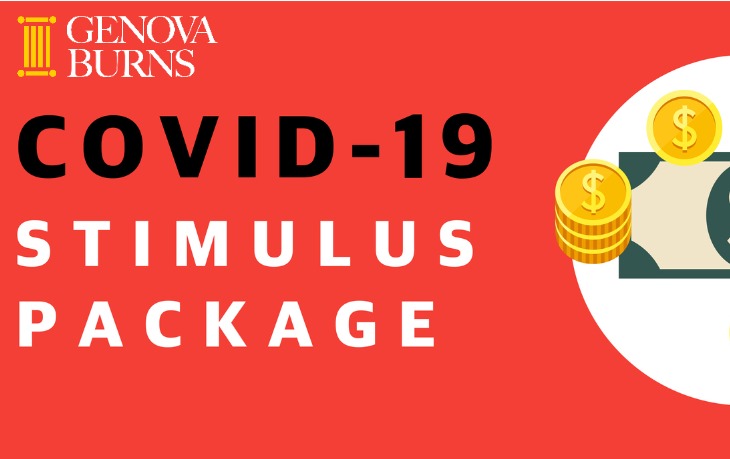Stimulus – Implications for Recipients of PPP and EIDL Advances
Are you eligible for more?
December 23, 2020 | By: Keith A. Krauss, Esq.
Late Monday evening (December 21, 2020), Congress passed a $900 billion stimulus bill that, among other things, includes some continuation of relief (although modified) for individuals and businesses impacted by the coronavirus (COVID-19) pandemic, adds additional categories of allowable expenses under the Paycheck Protection Program (“PPP”), and tackles the prior determination of the Internal Revenue Service (“IRS”) that precluded recipients of PPP loans from taking deductions for expenses that were paid for with PPP loans and results in forgiveness.
Tax Treatment of Forgiven Amount / Deductibility of Expenses Paid for with PPP Loan
- While it had been clear in the Coronavirus Aid, Relief, and Economic Security (“CARES”) Act that forgiven PPP loan amounts would be excluded from recipients’ gross income (such that recipients would not be subject to federal income tax on that portion of the indebtedness that is forgiven), the IRS negated the benefits of such exclusion with its issuance of Notice 2020-32 and other guidance by stating that no deduction would be allowed for an expense that would otherwise be deductible if the payment of the expense results in forgiveness of the [PPP] loan…and the income associated with the forgiveness is excluded from gross income.” That is, by disallowing the deduction of such expenses which would otherwise have been be deductible, recipients would have been faced with a higher tax obligation. The pending bill directly addresses the IRS’s determination by:
o Reaffirming that no amount shall be included in gross income by reason of PPP loan forgiveness (i.e. recipients will not be subject to tax on forgiven PPP indebtedness); and
o Stating that no deduction shall be denied, no tax attribute shall be reduced, and no basis increase denied, by reason of the exclusion from gross income of such forgiveness of PPP loans (i.e. recipients may deduct those allowable expenses that are otherwise deductible under the Internal Revenue Code as business expenses, even if the payment of the expense results in forgiveness of the PPP loan).
Similar legislation for New Jersey State Tax
o A similar bill was introduced, and has been referred to the State’s Assembly Appropriations Committee. This bill (NJ A5149) provides that “a loan, or portion thereof, forgiven pursuant to Section 1106 of the federal CARES Act, Pub. L. 116-136, shall not be included in the calculation of New Jersey gross income subject to tax under the New Jersey Gross Income Tax Act”…and “[a] taxpayer under the New Jersey Gross Income Tax Act shall not be denied a deduction by reason of the exclusion from New Jersey gross income under the New Jersey Gross Income Tax Act of a loan, or portion thereof, forgiven pursuant to section 1106 of the federal CARES Act…” That is, a PPP recipient that receives loan forgiveness would not be required to include the forgiven amount in its gross income calculations and would not be disallowed its business deductions for expenses paid for with forgiven PPP loans.
Availability of PPP Loans to New Borrowers and Prior/Existing Borrowers; Highlights of Changes
- PPP Second Draw Loans
o Eligible Entities*
Any business concern, nonprofit organization, housing cooperative, veterans organization, Tribal business concern, eligible self-employed individual, sole proprietor, independent contractor, or small agriculture cooperative that employs not more than 300 employees. Note this is a reduction from the original PPP eligibility rules.
In addition, to be eligible, such applicant must meet a specific needs test based on reductions of 25% or more in gross receipts experienced in 2020, as compared against the same periods (or as otherwise directed) in 2019.
Businesses identified in 13 CFR 120.110 remain largely ineligible, including businesses primarily engaged in political or lobbying activities (which shall include any entity that is organized for research or for engaging in advocacy efforts or, notably, “describes itself as a think tank in any public documents”).
Businesses (specifically live venue operators, promoters, theatrical producers, or live performing arts organization operators, relevant museum operators, motion picture theatre operators, and talent representatives, eligible for, and who receive, “Shuttered Venue Operator Grants” (created under the pending bill) are ineligible.
An entity that is an issuer, the securities of which are listed on an exchange registered as a national securities exchange under Section 6 of the Securities Exchange Act of 1934 is ineligible.
*This is not a comprehensive list of ineligible entities.
o Maximum Loan Amount**
Eligible entities may obtain a second draw loan in an amount equal to the lesser of (a) the product obtained by multiplying (i) at the election of the eligible entity, the average total monthly payment for payroll costs incurred or paid by the eligible entity during (x) the 1-year period before the date on which the loan is made, or (y) calendar year 2019, by 2.5, or (b) $2 million.
**The formula varies for seasonal employers, new entities (that did not exist during the 1-year period preceding February 15, 2020), and businesses in the accommodation and food services sector.
• Expansion of Allowable Uses/Expenses for PPP Loans (and Second Draw Loans)
o Recipients of PPP loans may apply a portion of those proceeds for (i) covered operations expenditures, e.g. business software; (ii) covered property damage costs, e.g. to address looting and vandalism that occurred in 2020, which were not covered by insurance or other compensation; (iii) covered supplier costs that are essential to operations; and (iv) covered worker protection expenditures, e.g. air pressure filtration systems. Note that the requirement that at least 60% of the PPP loan amount be dedicated to “payroll costs” remains.
o Group life, disability, vision, and dental insurance are allowable uses.
- Simplified Forgiveness for PPP Loans up to $150,000
o Requires submission not later than 24 days after enactment of the pending bill.
o Offers forgiveness with the submission of a 1-page certification by the recipient.
o Recipients must nevertheless retain their records for 4 and 3 years for employment and other records, respectively, after submission of their forgiveness applications.
- Impact of Receipt of EIDL Advance on PPP Loan Forgiveness
o An entity that received both an EIDL advance and a PPP loan is no longer subject to a reduction in the PPP loan forgiveness amount due to its receipt of an EIDL advance. That is, an entity may be eligible for full forgiveness of the PPP loan (subject to use of the loan proceeds for allowable purposes and compliance with all other loan requirements, generally, including eligibility requirements) notwithstanding its receipt of an EIDL grant.
Availability of EIDL Advances (Grants); Highlights of Changes
- Eligible Entities:
o Must be eligible for an EIDL (loan), per program regulations and guidelines;
o Must be located in a low-income community;
o Must have suffered an economic loss of greater than 30%; and
o Employs not more than 300 employees.
- Maximum Amount:
o $10,000 without regard to whether the loan (EIDL) is approved, whether recipient accepts the loan, and whether recipient received a PPP loan.
o If recipient previously received an emergency EIDL grant, applicant may only receive the difference between $10,000 and the amount previously received as an EIDL grant.
Tax Clarifications:
o EIDL advances are also excluded from the gross income of the person or entity that received such advance.
o Similar to the tax treatment clarifications for forgiven PPP loans, no deductions shall be denied, no tax attribute shall be reduced, and no basis shall be denied, by reason of the exclusion from gross income of such EIDL grants obtained by an eligible business.
Please keep in mind that the bill contains several other provisions that deal with other sections of the CARES Act and create other funds/programs providing support to specific hard-hit industries (like live venue operator or promoter, theatrical producers, live performing arts organization operator, motion picture theatre operator, and talent representatives). We invite you to continue to check our Resource Center for information regarding the pending bill (including other provisions contained therewithin), as well as regulations and guidance to be issued by the SBA Administrator regarding the same, and other programs.
Tags: GENOVA BURNS LLC • PPP • COVID • Keith A. Krauss • Young-Ji Park • Forgiveness


